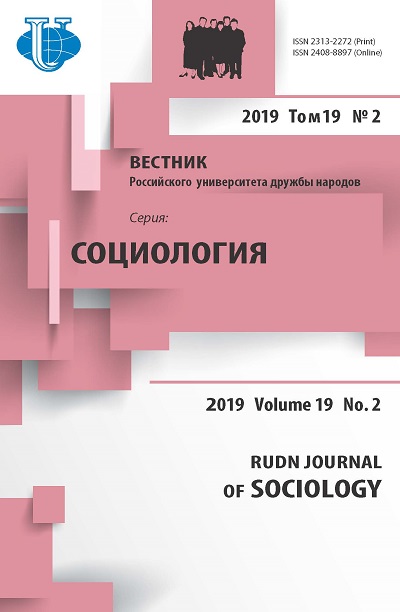The trends of political communication under social modernization
- Authors: Kiselev AG1, Kirichek PN2
-
Affiliations:
- Presidential Herald News Bulletin
- Dubna State University of the Moscow Region
- Issue: Vol 19, No 2 (2019)
- Pages: 322-336
- Section: Sociological lectures
- URL: https://journals.rudn.ru/sociology/article/view/21104
- DOI: https://doi.org/10.22363/2313-2272-2019-19-2-322-336
- ID: 21104
Cite item
Full Text
Abstract
The article considers the trends of political communication under the social-cultural dynamics of post-industrial society; emphasizes the maximization of the political-communicative factor in accelerating social progress; assesses the role of political communicative systems in the causal complex of social transformations; describes the resources of political communication to solve the problems of organization and self-organization of public life; considers the constructive possibilities of political-communicative systems to optimize relations between the state and society on the democratic basis; identifies the role of political communication in the development of civil society. The authors describe two mega-elements in the political communication - mechanics (form) and socionics (content); provide an updated and expanded description of the object and subject of political communication in connection with its structural-functional arsenal (activity, semantic, normative and systemic); explain the optimal mode of information exchange between citizens through the channels of political communication - political discourse and its genres in the public sphere with an emphasis on television talk shows; assess the importance of the moral-ethical aspect for the political sector of public life; compare the same in essence and different in specifics ‘faces of power’ in connection with its functions. The article also identifies political-communicative conditions for the agreement (compromise) between the government and the people on socially significant issues; clarifies the ideological-technological features of the contemporary political communication; defines the “golden ratio” of communication in the political sphere - a managerial decision, and provides positive and negative examples of managerial decisions within the political-communicative transfer; emphasizes the need to construct a political-communicative process as a dialogue between the elite (government) and the masses (people).
Keywords
About the authors
A G Kiselev
Presidential Herald News Bulletin
Author for correspondence.
Email: alexandr.profession@yandex.ru
-
Yagodnaya St., 8-1, Moscow, Russia, 115598P N Kirichek
Dubna State University of the Moscow Region
Email: kpn54@yandex.ru
-
Universitetskaya St., 19-1, Dubna, Russia, 141982References
- Grinberg T.E. Politicheskie tekhnologii: PR i reklama [Political Technologies: PR and Advertising]. Moscow; 2006 [In Russ.].
- Direktiva Stavki VGK No. 30053 komanduyushchim voyskami frontov i army [General Headquarters Directive No. 30053 to the Army Group and Army Commanders]. Stalin I.V. Sobr. soch. v 18 t. Vol. 15. Ch. 2. Moscow; 2009 (In Russ.).
- Dobrodel. Vesti Dubny ot 18.07.2018 (In Russ.).
- Luhmann N. Media kommunikatsii [Media Communications]. Moscow; 2005 (In Russ.).
- Monitoring osveshcheniya SMI prezidentskikh vyborov v Rossii [Monitoring of the Media Coverage of the Presidential Election in Russia]. Moscow; 2000 (In Russ.).
- Politicheskaya kommunikatsiya [Political Communication]. Moscow; 2004 (In Russ.).
- Politicheskaya kommunikatsiya v postsovetskoy Rossii: problemy formirovaniya i paradigmy razvitiya [Political Communication in Post-Soviet Russia: Challenges and Paradigms of Development]. Moscow; 2003 (In Russ.).
- Politologichesky slovar [Political Science Dictionary]. Moscow; 1994 (In Russ.).
- Soloviev A.I. Politologiya: Politicheskaya teoriya, politicheskie tekhnologii [Political Science: Political Theory, Political Technologies]. Moscow; 2005 (In Russ.).
- Toshchenko Zh.T., Kharchenko S.V. Sotsialnoe nastroyenie [Social Well-Being]. Moscow; 1996 (In Russ.).
- Habermas J. Moralnoe soznanie i kommunikativnoe deystvie [Moral Consciousness and Communicative Action]. Saint Petersburg; 2001 (In Russ.).
- Shalyganov Yu.V. Proekt Rossiya [Russia Project]. Moscow; 2013 (In Russ.).
- Shilina S.A. Politichesky diskurs kak raznovidnost upravlencheskogo diskursa: podkhody k opredeleniyu i interpretatsii [Political discourse as a managerial discourse: Approaches to definition and interpretation]. RUDN Journal of Sociology. 2017; 17 (In Russ.).
- Engels F. To Conrad Schmidt. Marx K., Engels F. Soch. 2-e izd. Vol. 37 (In Russ.).
- https://dobrodel.mosreg.ry/dorogi2018.
- Jaspers K. Die Ideeder Universitat. Berlin; 1923.
Supplementary files













